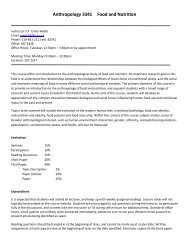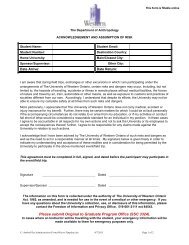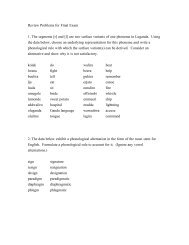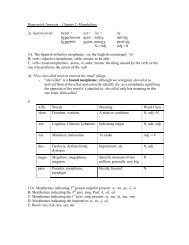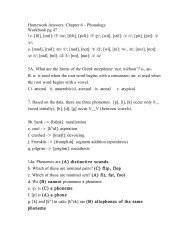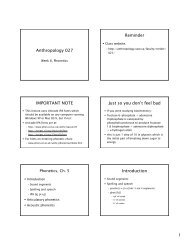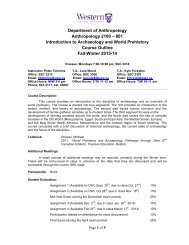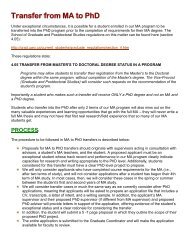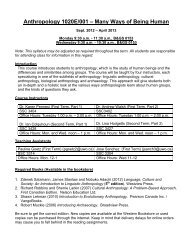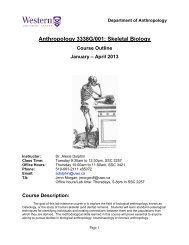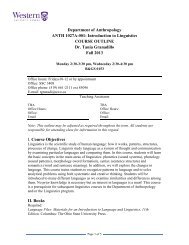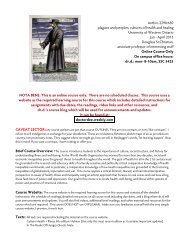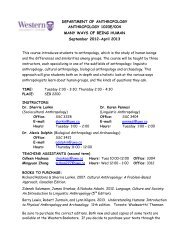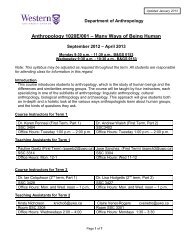PhD Comprehensive Exam Rules - Anthropology
PhD Comprehensive Exam Rules - Anthropology
PhD Comprehensive Exam Rules - Anthropology
Create successful ePaper yourself
Turn your PDF publications into a flip-book with our unique Google optimized e-Paper software.
1<strong>PhD</strong> <strong>Comprehensive</strong> Research & <strong>Exam</strong>s (Revised, March 2010)PurposeThe purpose of <strong>PhD</strong> comprehensive research and exams is to enhance and evaluate the student’s knowledge of areasrelated directly to their proposed <strong>PhD</strong> thesis research and how that research articulates with issues of broadertheoretical and methodological interest to the discipline. The research component entails focused research on topicsrelated to the student’s dissertation topic. The exam includes a written and an oral component, both of which should becompleted no later than the end of the second term of the second year of registration in the <strong>PhD</strong> program (i.e., in May ofYear 2, in most cases).Written <strong>Exam</strong>The written exam will consist of responses to three questions. There are a variety of forms the questions can take. Theycan range from ones more broadly phrased to more focused in scope and can have a theoretical, historical,methodological and/or substantive (ethnographic/geographic/temporal) focus. These details are worked out by thestudent’s supervisor and exam committee. Responses to each question will have a maximum length of 15 doublespacedpages, not including references. The responses will be evaluated by the student’s supervisor and at least twoother department members who shall constitute the student’s <strong>PhD</strong> comprehensive exam committee.Normally, the procedure for the written exam will be as follows (see attached table for a sense of how this fits into thetime-line of a program):1) Students and their committees are encouraged to determine general topic areas, including draft questions forguidance, for the comprehensive exam as quickly as is reasonably possible so that students may begin reading,compiling annotated bibliographies and drafting responses as soon as possible. The student will provide, in consultationwith their supervisor, a one or two page statement that represents either an initial description of the focus of theirdissertation research, or a preliminary draft of the proposal. This document will serve as a guideline for determining thespecific exam questions. There are a variety of forms that this process can take but the specific questions will bedeveloped by the student’s supervisor in consultation with the other members of the thesis exam committee and thestudent. This process will usually begin after the second term of the student’s first year in the program (i.e., usually Mayof the first year of enrolment in the program).2) In consultation with students and committee members, supervisors will determine an appropriate timeframe for thesubmission of responses to the comprehensive exam questions. Finalized questions/topics and a firm due date must beagreed upon by the student and supervisory committee six weeks in advance of this submission. In most cases, this duedate will fall within the first term of the second year of a student’s enrollment in the program. Responses must besubmitted in printed and electronic form to each member of the committee. In all cases, written responses must besubmitted early enough to ensure that they can be reviewed, commented on, revised (if necessary), and orally defendedby the end of the second term of a student’s second year in the program.3) Within two weeks of receiving a student’s submission, the supervisor and committee members will evaluate eachresponse separately and then meet to discuss these evaluations and arrive at an agreed upon grade for the student oneach question. In evaluating a student’s work, examiners must take into account both the content and the form of theseresponses, just as is done for theses. Within a week of this meeting, the student’s supervisor will compile thecommittee’s comments and provide these to the student.
24) Each question on the exam can be given one of three grades by each evaluator, and the majority decision of theevaluators will decide the outcome per question:a) Pass. If a majority of evaluators pass a written question, it will be declared a Pass.b) Fail. If a majority or half of the examiners fail a written question, it will be declared a Failure.c) Conditional Pass. A student may be given a conditional pass on a question. In these cases, the committee willidentify weaknesses in that specific answer and the student will, for each question ranked conditional, be givenextra time (to a maximum of one month) to provide a revised written answer. This revision can include adding apage or two of extra text beyond the 15 page original limit. Based upon this written response the student’sgrade on the question will be changed to either a pass or fail using the voting procedure described above.5) The results of the evaluation of written responses will determine whether the student is eligible to proceed to the oralexam. In order to proceed to the oral defence they must get passing grades on at least two of the three writtenresponses.If a student fails the written component of the comprehensive exam process, the committee will decide whether thestudent will be invited to rewrite it. In no case can the examination be rewritten more than once. If the student is notallowed to rewrite their responses, they will be asked to withdraw from the program.If the student passes the written exam the student can then be approved to proceed directly to the oral component ofthe exam process.Oral <strong>Exam</strong>:1) if a student has been ruled eligible to proceed to the oral exam, that defense will normally take place about twoweeks after the student has received the comments on their written responses. When preparing for the oral exam, thestudent should take direction from the comments provided by evaluators and passed on by the supervisor.2) the oral exam will be a formal procedure in the manner of a thesis defence. It will be chaired by the DepartmentGraduate Chair or his/her designate. It is the role of the <strong>Exam</strong> Defence Chair to make sure the defense follows theproper and stated procedures and that the student is provided an adequate and fair opportunity to respond to theexaminers’ queries. Following the procedures used in oral thesis defences, prior to the exam the examiners will decideon the order of questioning, the number of rounds of questions and the time to be allotted per examiner per round forthe questions and student responses. Unlike a thesis defence, the student’s supervisor can ask questions and participatein this examining process.3) Following the defence the student will be asked to leave the room so that examiners can deliberate. The results ofthis deliberation, either pass or fail, will be duly recorded by the Chair of the exam and attested to on a form providedfor this purpose and signed by all examiners as well. A pass will be deemed appropriate if 2 out of 3 examiners shouldpass the student based on their responses to the questions in the oral exam. If a failure is recorded at the discretion ofthe committee one re-examination may be allowed within one month of the failure. Otherwise the student will be askedto withdraw from the program.
3<strong>PhD</strong> Program TimelineYear 1Course work and development of preliminary drafts of research proposals or researchstatements from which comprehensive exam questions can be developed.By the beginning of the third term of enrollment in the program (usually May of Year 1),students should be in a position to begin the <strong>Comprehensive</strong> Research and <strong>Exam</strong>s process.In some cases (as when suitable courses may only be available in the first term of thesecond year of study), students may well wish to begin this process even earlier.By the end of year 1, students should be well into the comps process.Year 2Students consult with their committee to determine an appropriate deadline for theirwritten comprehensive exam. This deadline will usually fall within the first term of thesecond year of enrollment in the program (i.e., by December of Year 2 in most cases).Throughout the second year, students should be developing and revising their proposals.By the beginning of the third term of the second year of enrollment in the program (i.e.,by May of Year 2 for most), students should have fulfilled the following three programrequirements:1. Language requirement.2. Written and Oral <strong>Comprehensive</strong> <strong>Exam</strong>s.3. Completion of Written Proposal and Proposal Hearing.Year 3Year 4ResearchThesis Writing and Defense



